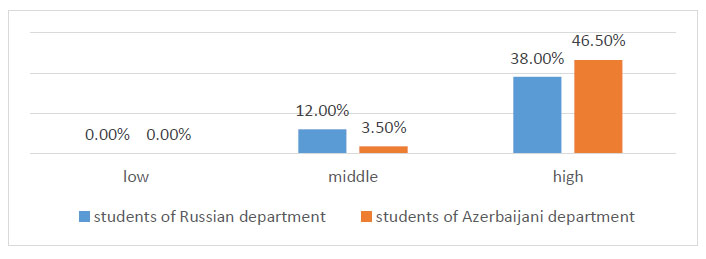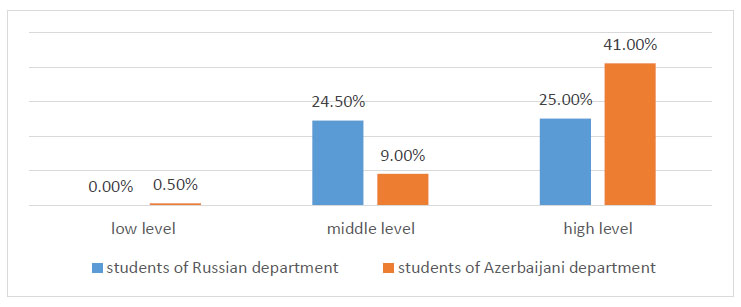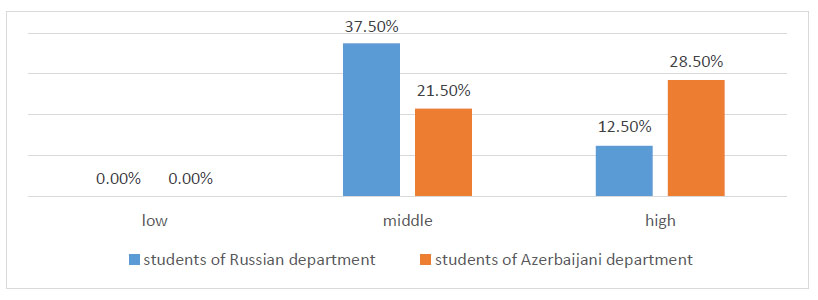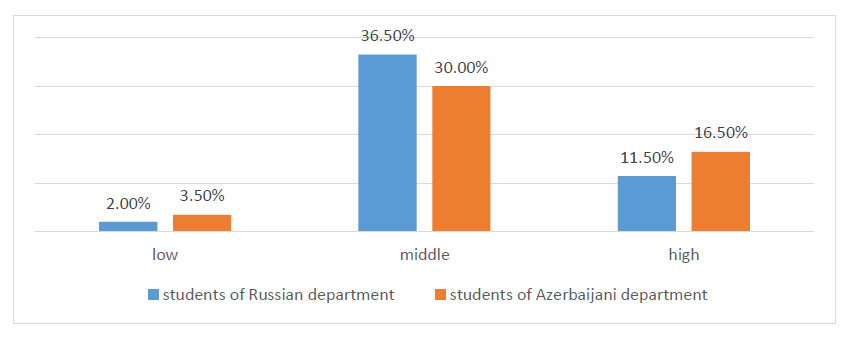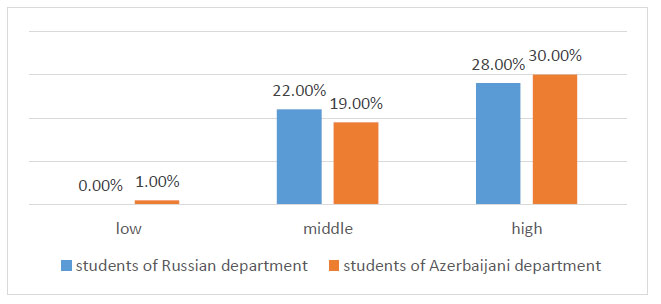Introduction
In the context of globalization, one of the main features of the modern era is the revival of national self-consciousness, ethnic identity and originality, strengthening the role of the ethnic factor in the social life of society. There is a growing interest in the native language, culture, traditions and history of their own people. However, this does not preclude the study of the ethnos of representatives of other peoples, especially in a polyethnic state.
In the study of ethnic characteristics, the focus is on cultural values, both material and spiritual, which involve the study of ethnic identity, ethno-cultural self.
Thus, a model of national identity can be proposed that takes into account the ratio of the general and the particular, i.e. in fact, it introduced the necessary multicultural values, not only by the "melting pot" method, but also by the rational ratio of the general and the individual.
The emotional expressiveness of ethnic self-consciousness at present in the context of globalization is the desire of peoples to keep their individuality in current realities, their value attitude to culture, myths, rites, rituals, and a traditional style of life. All of the above stresses the significance of studying ethnic identity, ethno-cultural self.
The research of the ethnic identity of young learners, as the most intimate part of self- consciousness, is of great relevance at the present stage of development. It is at this age stage that the formation and development of an individual system of value orientations, the integration and differentiation of individual need-motivational characteristics, and ethnic self-awareness are taking place.
The age of young students is an important step in the alteration of national self-awareness, its establishing and preservation. While studying at a higher educational institution, ethnic identity of a person at a young age develops, which contributes to the establishment of a system of clear knowledge about the world, about culture and clarifies the status of a young person in this world.
Definitely, it is possible to guess that the prosperity of society depends on the characteristics of value orientations, ethnic identity, ethnocultural self of modern youth, acting as a system of personal meanings, national sensory fabric in the structure of national self-awareness, and features of interethnic interaction. A stable active life position, moral convictions of young generation in the context of global modernization expansively determine the present and the future of the country and its people.
At the present stage of social development, the task of construction and formation of ethnic identity has a significant role on the patterns and practice of pedagogical activity. Currently, the pedagogical process does not pay due attention to issues of self-education, self- development, the formation of national self-awareness of youth, and also does not take into consideration the principles of multicultural education and multiculturalism as an essential element in social development.
A research of the above situation involves a special necessity for pedagogical issues of managing the ethnic socialization of modern youth, the formation of ethnic concepts, the formation of an ethnocultural self. However, it should be noted that pedagogical management is carried out not only at the group level of an ethnocultural We, that is, values about the specificity, traditions, culture of an ethnos, but also at the level of individual ethnic identity, ethnocultural I.
The state policy of multiculturalism, the modern education system is actively forming positive interethnic attitudes. But this does not exclude certain facts of negative perception of a particular ethnic group in the youth, student environment.
The need to formulate issues of actualization and implementation of the ethnocultural self in the students' self-awareness generates significant confrontations in the pedagogical process, which push this psychological and pedagogical task into a list of extremely important problems that require proper dialectic resolution:
between world determination, including Azerbaijani traditions, towards unification and globalization and the extreme neccesity to save ethnic values and identities;
between the actualization of the ethnocultural Self and the formation of a tolerant attitude towards other ethnic groups;
between the determination of the diffusion of ethnic identity and the need for the development of ethnic consciousness, ethnocultural self as a prerequisite for the formation of a clear civic position of modernized youth.
Argumentation
Cyberbullying (Ciberacoso)
The noted contradictions denote the problem: what conditions are necessary for actualizing national self-consciousness, ethnocultural I as a natural development of ethnocultural We, the formation of a constructive life position of modern young people participating in the educational process.
Ethnicity is a material owner of social values and standards. A substantial revision of the role and significance of different ethnic groups and the impact of these processes on the self- consciousness of peoples becomes a definite system for the basis of ethnocultural education. This field of the educational process is the most correlated with the idea of reviving the numerous forms that have invented throughout history, types of ethnocultural activity.
The fundamental necessity is an identification the role of the ethnic significance of culture in explaining the meaning of ethno-cultural educational technical devices. The practical side of the educational process and the educational situation show that the formation of special abilities is closely related to the ethno-confessional and professional way of life.
Thus, the problem of ethnic consciousness was very relevant both in the past and in the present. Psychological works and studies of consciousness and self-identity of a person occupy a significant place in the series of psychological literature.
Initially, the inclinations of ideas in the field of the psychology of peoples were considered by Hippocrates in the scientific treatise "On Air, Water, Terrain." The scientist believed that the peoples, as well as the "national spirit" are different from each other, since the climatic zones are different, the locations of the countries are different (Hasanov, 2010)
The theory of ethnicity, which considers the problems of ethnic consciousness, was developed by ethnopsychologists. In 1860, scientists H. Steinthal and M. Lazarus named the "psychology of people" a different scientific branch from the rest. They analyzed the "folk spirit" as the likeness of individuals at the intellectual level who are representatives of a certain people, as well as their self-identity, the essence of which can be revealed through a comparative analysis of linguistic and cultural characteristics (Martynenko, 2004). In order for the unity of ethnopsychological phenomena to form, the functioning of the basic products of the spiritual cultural community, namely language, moral features, mythology, is necessary. To explain such a "single spiritual community," W. Wundt proposed the concept of "spiritual community" (spiritual community). According to the author, the generation of derivatives of the national soul comes down to combining the energy of a large number of people who are in interactive relationships and living on the spiritual interaction of many who are attributed to these phenomena (Wundt, 2004). W. Wundt believes that should and has the opportunity to study the creative joint activities of the people. This is possible if you work in two directions: abstract and concretized. The first direction involves the study of the spirit of the people through those connections between individuals, believing that myths are the feelings of the people, foundations and customs are volitional and moral principles. The second direction involves the analysis of a particular ethnic group, using the results of the study according to the first option. Ethnic identity as a psychological phenomenon for a certain time was not the subject of study, but only met in the framework of such phenomena as "peoples psychology", "national character", "national spirit", etc (Starovoitova, 1985; Shipilov, 2006).
Analyzing modern research results, within the framework of modern Azerbaijani psychology, issues of ethnic identity were demonstrated in the works of the following Azerbaijani authors (Bayramov, 2001; Alizade, 2003; Aliyeva, 2002).
In modern scientific literature, the phenomenon of "Self-concept" is used mainly to designate and understand ethnic self-determination in foreign psychology. It was constructed within the framework of the theory of C. Rogers and is a set of perceptions that reflect the position of a person in various life situations, and arises on the basis of interaction with the social environment.
Starting from the second half of the 20th century, the issue of ethnic self-determination occupies a special place in studies of ethnic identity in the USA, supplementing, and most often replacing, the established concepts: "Self" (R. Burne, U James), "glass self" (Ch. Cooley), "self", "self", "identity" (E. Erickson, K. Jaspers), "Self-concept" (C. Rogers, M. Rosenberg).
The concept of identity is comprehensively developed in the writings of the famous American scientist, social psychologist E. Erickson, who especially emphasized the adaptive nature of the individual's behavior, the main integrative characteristic of which is identity. The researcher defines this concept as a feeling of an individual's organic belonging to his history, a type of interpersonal interaction characteristic of a given era. The identity of a person supposes the harmony of ideas, images, values and actions belongaing to her with the socio-psychological image of a person dominating in a given historical time, her acceptance of social being as her own (Phinney, 1990; Erickson, 1996).
E. Erickson considered identity in two aspects. Firstly, it is the "I-identity", which includes two components: organic, i.e. given the physical appearance and natural inclinations of man, and individual, i.e. understanding of his own uniqueness, the desire for self-improvement and implementation of his own abilities and interests. Secondly, social identity, which consists of group and psychosocial. The group identity considered by E. Erickson is the involvement of the individual in various communities, supported by the subjective perception of internal unity with his social environment. Finally, psychosocial identity - this is what gives a person feels the importance of his being in the framework of this society (and from the point of view of society).
When it comes to the ethnic definition of identification, and more specifically self- identification, they talk about an individual comparing himself with any ethnic community, about a sense of belonging to this ethnic group based on certain ethnic characteristics. Comparison of these terms is made by mixing the concepts of a sense of belonging and a single " Self image" as an ethnic representative as a necessary condition for goal-setting.
Ethnic self-determination depends on complex, interdependent external and internal factors. Not only external orientational designations (ethnonym, language, culture, family, relatives, etc.), but also the inner self-awareness, well-being of a person determines these actions. A feeling of kinship is not the result of so much joint activity as the display of sensory relations with this community.
Ethnic identity is becoming the most important factor for ethnic groups to form and develop their social ties. Therefore, based on this, correlation with a large social (ethnic) community can be a fairly strong accelerator of mass behavior and political action. Consequently, the popularity of a certain group self-determination (in particular, ethnic) can be one of the factors predicting a possible trend in the political development of society (Erickson, 1996)
When an individual identifies himself with a particular ethnic group, he thereby includes such values, beliefs, ideas that characterize this community, as well as being unique and inimitable.
The basic psychological needs of a person determine ethnic identity, namely: 1) the need for protection and the need for security; 2) the need for belonging to a community, to a group; (according to E. Fromm, in a state of social crisis, a person is usually quite ready to exchange their newfound (or imposed) freedom for a sense of (even real) security and belonging to a group; 3) the need for originality, uniqueness, uniqueness of one's "I", confidence in oneself self, freedom from others, since the existence of a person as a person means his complete difference from others.
The listed basic needs of a person are usually contradictory, since the processes of identification and individualization are unified (Fromm, 1993) Ethnic identity is a special sociocultural and socio-psychological phenomenon, as a result of which a person goes through a process of complex self-determination in the surrounding society in relation to many other ethnic groups. Ethnic self-determination is not only awareness and understanding, but also perception, emotional evaluation of one's involvement in an ethnic group (Tajfel, 1971; Stolin, 1993; Shpet, 1996; Tiedt & Tiedt, 1999; Stefanenko, 2002).
Based on this, two important components are distinguished in the structure of ethnic identity -cognitive and emotional- evaluative. The cognitive component includes ethnic awareness (certain specific knowledge and perceptions of the individual about ethnic groups - the history of their own and other ethnic groups, their traditions, as well as the existing differences between them), as well as ethnic self-identification (the use of ethnic "labels" - ethnonyms). An emotional-evaluative component is an assessment of the qualities and traits of one's group, attitude to membership in it, and how important this membership is for a person.
Method
inney's method that determines the expression of ethnic identity through Scale questionnaire by O.L. Romanova for the study of ethnic identity
The hypothesis of the research is that the ethnic self-consciousness of young students (Azerbaijanis) is identified by a certain intensity of ethnocultural self, ethnic identity and tolerance, the effective formation of which is carried out in educational activities.
Results
The research has involved 200 students from various faculties of the Baku State University, of whom 100 people have been students of the second and third years of the Azerbaijani Department of the faculties of Social Sciences and Psychology, Philology, Applied Mathematics, and the other 100 are students of the second and third years of the Russian Department of the faculties of Social Sciences and Psychology, Philology, Applied Mathematics.
Scale questionnaire by O.L. Romanova for the study of ethnic identity
The first scale characterizes the sense of belonging to own group. Analysis of the results under the first scale shows that students of the Azerbaijani Department have indicators of a sense of belonging to their ethnic group higher than students of the Russian Department (Figure 1).
The second scale characterizes the significance of ethnicity (Figure 2).
Analysis of the results shows that students of the Azerbaijani Department have higher indicators than students of the Russian Department. This indicates that ethnicity is very significant for students of the Azerbaijani Department.
The third scale defines the relationship of the ethnic environment, that is, the relationship between the majority and the minority (Figure 3). Analysis of the results has revealed that the students of the Azerbaijani Department have higher indicators than students of the Russian Department. That is, students of the Azerbaijani Department are more inclined to believe that the ethnic majority should dominate and have certain advantages in society (Table 1).
Table 1 Statistical indicators by the method of "Scale questionnaire by O.L. Romanova for the study of ethnic identity"
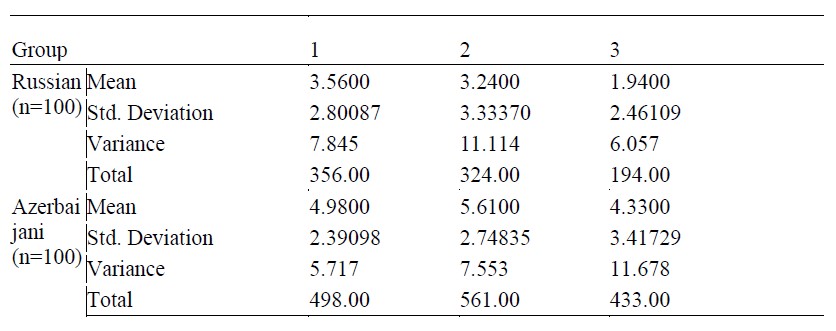
Note: 1='a sense of belonging to own group'.2= significance of ethnicity, 3= the relationship of the ethnic majority and minority (Table 2)
Table 2 Correlations of "Scale questionnaire by O.L. Romanova for the study of ethnic identity

Note: **. Correlation is significant at the 0.01 level (2-tailed)
Statistical processing using the SPSS Method according to this methodology reveals the existence of dependence between the indicators of all three scales and the training departments (Azerbaijani and Russian). Significant differences have been revealed according to the t-test table.
1. Finney's method measuring the degree of intensity of ethnic identity.
The first component of the expression of ethnic identity is cognitive (Figure 4). Analysis of the results shows that students of the Azerbaijani Department have indicators of the cognitive element of the ethnic identity higher than those of the students of the Russian Department. This means that the degree of awareness of their belonging to this ethnic group, opinions about the features of their own ethnic group are higher among students of the Azerbaijani Department.
The second component of the expression of ethnic identity is affective (Figure 5). Analysis of the results reveals the fact that students of the Azerbaijani Department have indicators of the affective component of ethnic identity higher than students of the Russian Department. This indicates a positive attitude towards their ethnos as a whole, as well as the fact that young people have a pronounced emotional sense of belonging to their ethnic group, a high sensitivity towards their ethnos.
Statistical processing using the SPSS Method according to this methodology reveals the existence of dependence between the indicators of all three scales and the training departments (Azerbaijani and Russian). Significant differences have been revealed according to the t-test table (Table 3, Table 4 and Table 5).
Table 3 Statistical indicators by the method of Finney's method measuring the degree of intensity of ethnic identity
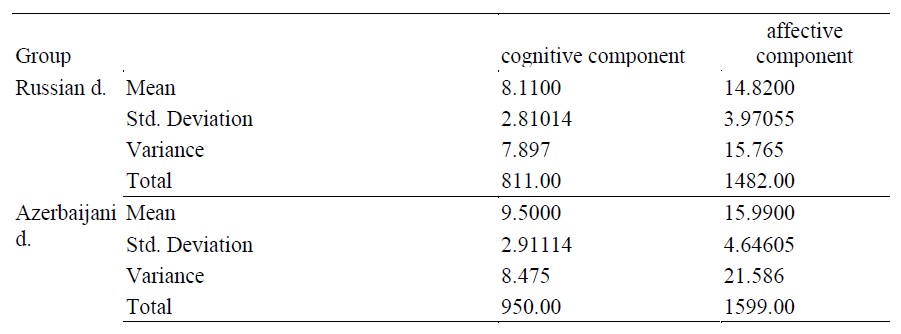
Table 5 Independent sample Test of Finney's method measuring the degree of intensity of ethnic identity

Analysis of the tables and figures according to the second methodology shows that students of the Azerbaijani Department have indicators of cognitive and affective components of ethnic identity higher than students of the Russian Department. In our opinion, knowledge and ideas about the characteristics of their ethnic group among students in the Azerbaijani Department are more stable and settled, and also they are more emotionally attached to their own ethnic group and culture.
Discussion
The results of the research have confirmed that the ethnic self-consciousness of modern students (Azerbaijanis) is characterized by a certain expression of ethnocultural self, ethnic identity and tolerance, the effective formation of which is carried out in educational activities.
The second language and intercultural enrichment are essential factors of ethnic socialization and therefore, the language of instruction has a significant impact on the indicators of tolerance and ethnic identity in student groups. According to these provisions, we have revealed a higher level of tolerance in the Russian Department and a high degree of expression of ethnic identity among students of the Azerbaijani Department.
A significant factor in the formation of ethnic identity is the age factor and level of education. Developing in direction of personal identity and actualizing, ethnic identity has an age- related dynamic of development.
In our opinion, the practical significance of the results has a great importance, while it indicates a new promising line of research in the field of pedagogical and ethnic psychology. Young people have a high interest to the issues of social interaction and development of ethnic identity in the context of learning activities.
Ethnocultural self, ethnic identity shows the direction, value orientations of the behaviour of young people and helps to anticipate the development of positive or negative ethnic phenomena in society. More consideration should have been towards pedagogical activity to the modernization and development of ethnic self-consciousness and ethno-cultural self, marking the principles of polycultural education














